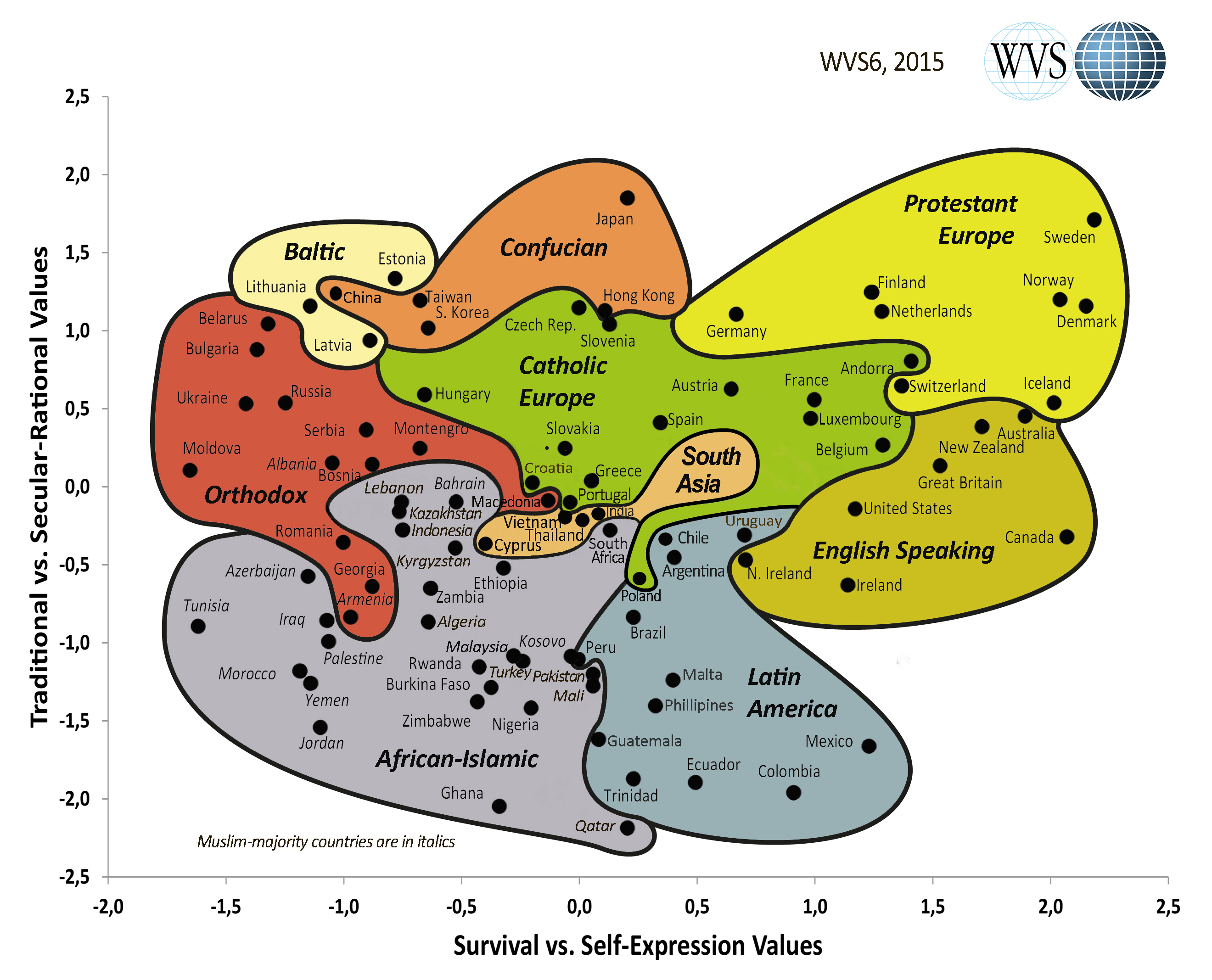"The World Values Survey (WVS) is a global research project that explores people’s values and beliefs, how they change over time and what social and political impact they have. It is carried out by a worldwide network of social scientists who, since 1981, have conducted representative national surveys in almost 100 countries."
According to the Wikipedia article, the survey is carried out through questionnaires, and the results can be usefully compressed to the two-dimensional representation shown above, which repays some study (click on the image to make it larger).
The labelling of the two axes is less than clear: I suspect that:
- the horizontal axis measures clan/group conformity - individualism
- the vertical axis is capturing religiosity - secularism.
Decide for yourself: here is what the article says:
"Traditional values emphasize the importance of religion, parent-child ties, deference to authority and traditional family values. People who embrace these values also reject divorce, abortion, euthanasia and suicide. These societies have high levels of national pride and a nationalistic outlook.This would be quite interesting in itself, but Peter Turchin's recent post applies it to the evolution of the European Union. First he notes:
"Secular-rational values have the opposite preferences to the traditional values. These societies place less emphasis on religion, traditional family values and authority. Divorce, abortion, euthanasia and suicide are seen as relatively acceptable.
"Survival values place emphasis on economic and physical security. It is linked with a relatively ethnocentric outlook and low levels of trust and tolerance.
"Self-expression values give high priority to environmental protection, growing tolerance of foreigners, gays and lesbians and gender equality, and rising demands for participation in decision-making in economic and political life."
"As I have said on numerous occasions (in this blog and in my other writings), it is hard to get people to cooperate, especially in large social groups. Successful cooperation requires that people share values and institutions. Values tell us why we want to cooperate: what is the public good that we collectively want to produce? Norms and institutions tell us how we are going to organize cooperation. Mismatched values and institutions may doom a cooperative effort even before it has a chance to get going.Here is his key insight:
"In my opinion, the expansion from the original six nations (Benelux, France, Germany, and Italy – I will refer to them as the “core” EU nations) to the current 28 was a big, big mistake. We can use the data collected by the World Values Survey (WVS) to visualize just how bad this mistake was."
" I am interested to look at this mapping from a different point of view. Accordingly, I color-coded all countries into the following categories:Dr Turchin continues,
- Core (red): the original 6 countries of the EEC
- EU (brown): the other 22 members of the European Union
- Europe (green): two Western European countries that are not in the EU
- Candidate (yellow): current candidates for the EU
- World (grey): rest of the world (country names omitted for clutter).
"Note: the reason Italy* has an asterix is because, for some reason, it was not included in the sixth wave, so I used its values from the fifth wave data."
"The pattern is so striking it almost doesn’t require commentary, but let’s spell it out anyway. The original six (“Core Europe”) group together very closely. There are only two other countries that are part of the same cluster, Austria and Switzerland.You can see where Turkey is. And as for the absence of 'African-Islamic countries', the EU is doing its best to resolve that particular anomaly even as we speak.
"Remarkably, the modern territories of both of these countries were encompassed by the boundaries of the Carolingian empire (see Is this the Beginning of the End for the European Union?). It looks like the “ghost” of Charlemagne’s empire has more influence on today’s cultural values than such later distinctions as Catholicism versus Protestantism.
"The current 28 members of the European Union, on the other hand, don’t cluster at all. On the contrary, they span three-quarters of world variation in values. Only African-Islamic countries and central America end up outside the ellipse that encompasses all 28 EU members."
If only they had understood Asabiyyah as well as the British Foreign Office, back in the days when it could still do realpolitik.

No comments:
Post a Comment
Comments are moderated. Keep it polite and no gratuitous links to your business website - we're not a billboard here.